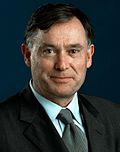German presidential election, 2004
|
|
|||||||||||||||||
|---|---|---|---|---|---|---|---|---|---|---|---|---|---|---|---|---|---|
|
|||||||||||||||||
|
|||||||||||||||||
|
|||||||||||||||||
The President of Germany (Bundespräsident) is the titular head of state of the Federal Republic of Germany. The president's tasks are mostly ceremonial, but for the signing of all new federal laws before they go into effect. In practice however, all presidents have had informal influence on politics and society but mostly in a non-partisan way.
The president is not elected directly by the voters but by a special Federal Convention (Bundesversammlung) which is assembled every five years for this task alone. This body consists of the members of the Bundestag and an equal number of members selected by the sixteen federal state parliaments.
The election date was at the time set on May 23 every five years in the national capital Berlin. May 23 is the date the German Grundgesetz was accepted in 1949, but the date will be changed when a President leaves office before the completion of their term (as has happened before). Of the 1,206 members only 549 belonged to the parties that controlled the federal government - the Social Democrats (SPD)) and the German Green Party. Also in their camp were the 31 members of the Party of Democratic Socialism (PDS). The opposition parties, the (Christian Democratic Union/Christian Social Union (CDU/CSU) and Free Democratic Party (FDP), however, had a majority of 624 members because they commanded more seats in the federal states. One member belonged to a regional party; one was non-aligned.
...
Wikipedia


